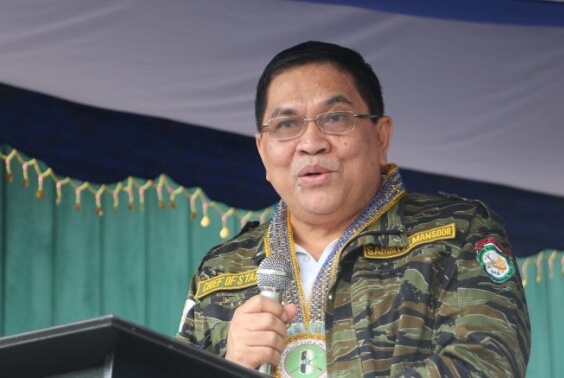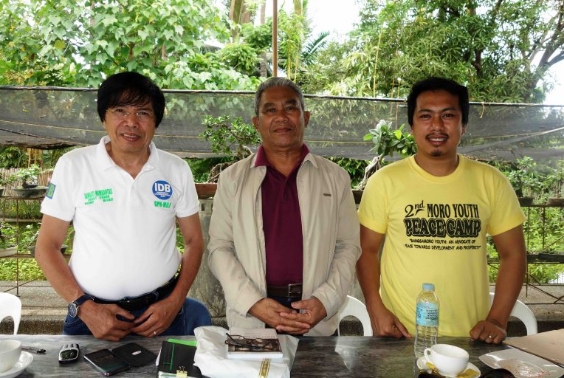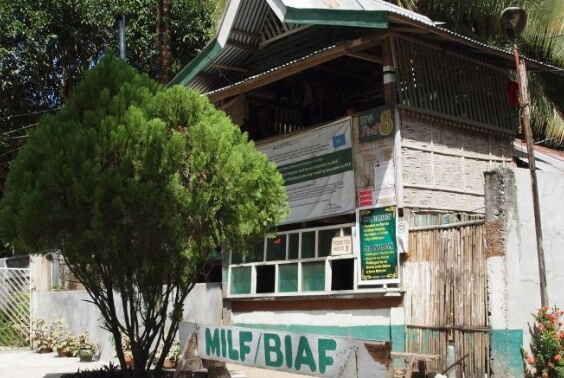- SOUTHERN PHILIPPINES
Toward Creating The Bangsamoro Regional Police: A Review of the Recommendations of the ICP
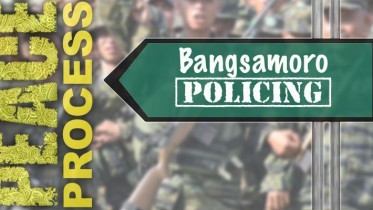
On 27th March 2014, the Moro Islamic Liberation Front (MILF) signed a comprehensive peace agreement with the Government of the Philippines (GPH) after more than four decades of separatist struggle. The autonomous Bangsamoro Government is to be established through an election scheduled in 2016.
The Independent Commission on Policing (ICP), which I participated as one of the foreign commissioners, submitted a policy recommendation report to the Mindanao Peace Panel after a series of discussions on the structure of the new police in the Bangsamoro. The report has now become a public document, so this paper will discuss its contents with particular attention to points regarding what is called “normalization”, a security arrangement for the Bangsamoro community. Normalization can be defined as an act of putting down weapons, as a requirement for the peace agreement, by the MILF that had continued armed struggle, and transferring the law enforcement function of the GPH to the Bangsamoro Government.
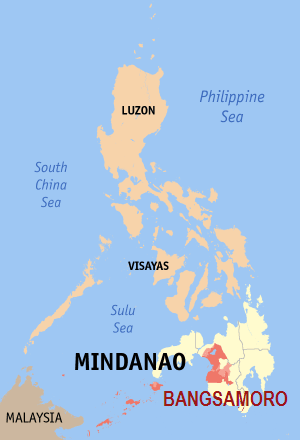
1. Overview of the ICP Report
The ICP report consists of 152 pages and includes108 recommendations. The report has 13 chapters and its outline is as follows:
Chapter 1: Task and Overview of the ICP.
Chapter 2: Stakeholder Consolidations.
Chapter 3: Legal Framework.
Chapter 4: Accountability
Chapter 5: Accountability through a Police Board for the Bangsamoro.
Chapter 6: Management and Structure.
Chapter 7: Human Rights.
Chapter 8: Education, Training and Development.
Chapter 9: Ethos, Values and Symbols.
Chapter 10: Strategic Communication and Messaging Change.
Chapter 11: Implementation.
Chapter 12: Transition—Implementation Road Map.
Chapter 13: Summary of Recommendations.
In addition, 8 appendixes are attached to the report. The discussion was held based on the premise that the current police structure is not sufficient and the fundamental reform was needed. Therefore, the report covers a broad range of issues and presents detailed ideas for reform.
Among the seven ICP commissioners, all except for the representative of the MILF and myself had worked as a police officer. As a result, the discussion within the ICP tended to focus on the technical matters. For example, in the Chapter 6 on “Management and Structure”, 33 recommendations were put forward. From a viewpoint of an expert of security sector reform and peacebuilding, I have contributed to the discussion on the issues related to implementation and transition (provisional responses and bridging measures), which are covered respectively in the Chapter 11 and 12. Also, I have contributed to the discussion on the Chapter 8 on “Education, Training and Development” with Japanese assistance in mind.
All the commissioners, including myself, believed that the issue of accountability, which was addressed in the Chapter 4 and 5, was paramount to all others. Hence, in the following, I will explain how the ICP sought to increase the accountability of the new police in the Bangsamoro. Before moving on to that main point, let me provide a basic outline of the police structure, of which the ICP proposed in its report.
2. Basic Feature of the Bangsamoro Regional Police
Let me start with an aside. During the ICP deliberations the commissioners often got into an imbroglio due to their different positions. One of the most symbolic examples emerged when the name of the new police in the Bangsamoro was discussed. In the final draft of the ICP report, the name of the new police was written as the Bangsamoro Regional Police (BRP). The moment when all the commissioners were about to reach a consensus on all the 108 recommendations, goddess of misfortune appeared. Representatives from the GPH and those from MILF were divided on the point whether or not the term ‘Regional’ should be taken out. If one wishes to emphasize the fact that the new police would be an integral part of the Philippines National Police (PNP) with respect to the current Constitution, the term ‘Regional’ should remain.
On the other hand, if one wishes to clarify the fact that the new police would be different from the current institutional arrangement, in accordance with the sprit of the Framework Agreement on the Bangsamoro (FAB), then the term ‘Regional’ should be eliminated. The new police that the ICP proposed should fall clearly within the parameters of the PNP. At the same time, judging from the majority of the ICP recommendations, it was also crystal clear that the underlying assumption of the IPC recommendations was that the status quo would be unacceptable. After a series of attempt to fill this gap, the ICP commissioners still failed to reach a consensus. Nonetheless, in the ICP report, the ‘Bangsamoro Regional Police’ was proposed as the name of the new police in the Bangsamoro together with the proviso that this was not decided by a consensus of all the commissioners. As in the expression in the ICP report, the ‘Bangsamoro Regional Police’ (BRP) is used in this paper.
The primary feature of the BRP is that it places an utmost importance on community policing and public safety function. Also, it underlines the necessity of special consideration and understanding for human rights and Shari’ah (Islamic) law. The BRP is centered in the various activities leading to “normalization”. In other words, the BRP is expected to offer a platform under which the ex-combatants of the Bangsamoro Islamic Armed Forces (BIAF) who surrendered their weapons would be subsumed. The ICP commissioners have engaged in the deliberations keeping this premise in their mind.
This resulted in the two-wheels composition of the policing institution. That is, the ICP recommended that there should be two distinctive functions in the police: ‘Police Officers’ in charge of law enforcement would be recruited under the same standard with the PNP, and ‘Community Safety Officers’ in charge of public safety would be recruited by a different criteria from those of the PNP. It would be very difficult for BIAF soldiers, who spent most of their life in the jungle and fighting, to be able to meet the requirements for police officers, such as a bachelor’s degree.
However, it was obvious that if we failed to offer them appropriate reward and praise for their devotion, and force them to spend the rest of their life in obscurity, they could become a source of insecurity. To prevent this from happing, we proposed to create a position of Community Safety Officers so that BIAF soldiers can be transformed and given an option to serve for their community. Furthermore, through a bridging measure proposed in recommendation no. 91 in Chapter 8, those BIAF soldiers who wish to become a police officer can enroll themselves in training programs that would offer them multiple opportunities for capacity development to obtain the qualifications for a police officer.
This two-wheels system and the platform of Community Safety Officers can also be used to absorb current police officers who cannot meet the existing standard for the PNP officers. Robust ‘retooling’ programs should also be open to current police officers who fail to pass the (re)screening, and if they wish, they would also be given a chance to be reinstated in the formal police force when they meet the existing requirements for a police officer.
From a standpoint of peacebuilding, I wish Japan would extend its support to the bridging training for BIAF soldiers and the retooling programs for incumbent police officers. The ICP report maintains that it is imperative that among the existing cohorts of the PNP officers ‘Master Trainers’ are selected and given sufficient training so that they can lead the bridging training and retooling programs. Would it be possible to include the Master Trainers’ Training in Japan’s existing capacity development assistance to the PNP?
3. Accountability through a Police Board for the Bangsamoro
The current police institution in the Bangsamoro is a negative exemplum for the BRP. After a series of stakeholder consultations, the ICP reached a conclusion that the local people did not trust the current police. Why have the current police failed to win the trust of the local people? The ICP has endeavored to search for the reasons, and reached a conclusion that the most critical point was the lack of accountability of the current police to the people they serve.
The new police will have to be effective and neutral, and most importantly, they will have to win the trust of the people. Based on the understanding that illegitimate interference of the local politicians in policing can cause serious damage to the impartiality of the police, the ICP recommended to set up the Bangsamoro Regional Police Board (BRPB) as a trump to cut off illegal relationship between the police and politicians. The BRPB will be responsible for the act of the BRP and in so doing it can guarantee the accountability of the police to the people. Indeed, the ICP report devotes 28 recommendations to stipulate the regulations of the BRPB.
When these recommendations are put into effect, the appointive power of the heads of the Region, Province and City over the police officers in their jurisdictions, which has served as a hotbed for the cozy relationship between the police and politicians, need to be reformed. The ICP report proposed (in recommendation no. 21) that “the BRPB should be the only authority in the Bangsamoro which will select the Regional Director of the BRP, Deputy Regional Directors, Provincial Director and non-component City Chiefs of Police. Further, the Regional Director of the BRP, Deputy Regional Directors, and Provincial Director shall have the power and authority to employ and deploy units and elements of the BRP within their respective level of responsibility.”
The BRPB is not authorized to interfere with daily operations of the police, in order to prevent police officers from becoming private army for certain politicians. Hence, this recommendation will face enormous repercussions from the spoilers. If the BRPB were to be emasculated by the interference of the politicians who have vested interests in the current system, it would be extremely difficult for the BRP to win the trust of the people in the community.
Here, I would like to point out an issue that is not included in the ICP report but is nonetheless vital from the perspective of the community trust.
The MILF maintains that people trust them. This maybe true because it was the MILF that provided law and order for the community under the circumstance in which the current police malfunctioned. If this is true, it can be argued that allowing the people who have already won the trust of the community to play a central role in the BRP maybe a shortcut for the BPR to develop itself as an effective and neutral institution that can win the trust of the community. Of course, such nonsense could be rejected outright since it does not meet the standard for the modern policing model on which the police of the developing countries is based.
Moreover, it also violates the unwritten law of security sector reform (SSR), which draws a clear line between the police and the military. It also goes against the lesson that a good soldier does not necessarily posses the necessary qualifications for a police officer. Still, to reform the corrupted police completely so that the people in the community can have a fresh image, it might be wise to ask those who already enjoy the trust of the community to serve as police officers.
Final Remarks
Through the activities of the ICP, I had the privilege of listening to the voices of the people in the Bangsamoro. Most of the people whom I met were community leaders, intellectuals, business leaders, and BIAF commanders, and thus they did not necessarily represent the true voices of the people at the grassroots. At first, I hesitated to place the liberal concepts, such as accountability and human rights that would appease foreigners, including myself, in the centre of the ICP report. This view changed as I listened to the voices of the people in the Bangsamoro. They were asking for the accountability of the police and underlining the importance of the respect for human rights not as an empty rhetoric, but because they could hardly wait to see the birth of the police that can be truly trustworthy.
It is imperative that the ICP recommendations be firmly implemented for the BRP to meet the expectation of the community. Out of 108 recommendations, the ICP should have given certain recommendations priority over others. However, it was not possible to discuss all the recommendations and reach a consensus on the priority within the given timeframe for the ICP deliberations. Under such a circumstance, my humble attempt to solve the issue of prioritization can be found in the Chapter 12 on Transition, in which I was able to recapitulate the recommendations that require immediate attention. Among those recommendations listed in the Chapter 12, the preparation for Community Safety Officer program and the ‘Train-the-Trainer’ (Master Trainers’) program are the priority targets for Japan’s contribution towards Normalization and peace in the Bangsamoro.
Yuji UESUGI
Professor, Waseda University
Japanese government representative and member of the ICP





